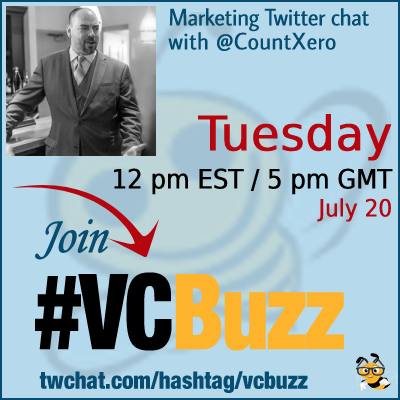
It is well known that many SEOs and marketers have love-hate relationships with Google.
We tend to hate and criticize many of Google’s moves but we still use and optimize for nothing but Google.
Is there a way to gap that bridge?
In other words, how to discover new opportunities “inside the box”, i.e. inside Google’s box?
***Add #VCBuzz chats to your calendar here.
***Please sign in here to follow the chat -> twchat.com/hashtag/vcbuzz
About Jeff Ferguson @CountXero
Jeff Ferguson @CountXero is partner at Amplitude Digital, an award-winning digital marketing agency.
With over 25 years of online marketing experience, Jeff has led the online marketing efforts for companies such as Hilton Hotels, Kimberly-Clark, InterActiveCorp, Experian, and Napster.
Jeff also teaches digital marketing courses at the University of California, Los Angeles (UCLA). Connect to Jeff on Linkedin
Questions we discussed
Q1 How did you become a digital marketer? Please share your career story!
I graduated from undergrad in 1995 with degrees in comp sci and communications, intending to become a copywriter; however, the world had other plans for me. I kept getting asked about the internet in interviews and passed on the first few offers.
Then, my 1st student loan bill arrived, and in the following interview, I said I knew everything about the internet. I started as a “webmaster” but eventually moved away from the tech side of things, focusing more on marketing.
However, rather than specializing in one aspect of digital marketing, I touched them all, which was pretty standard back then. I guess I’m more known in “search engine” circles, but I’ve worked with everything.
Agreed about it being standard to get involved in many areas. I was working as a CPA, hadn't had much formal training, but clients expected you to know technology. So, you figured it out as needed. #vcbuzz
— Dana Lemaster Author (@LemasterAuthor) July 20, 2021
We’ll probably talk about the evolution of job roles and responsibilities later, but I think that’s something we really need to look at again in digital marketing.
Your overall perspective is the glue that can bring it all together. Digital marketing is been in too many silos. #vcbuzz
— Jeannie Hill (@essentialskill) July 20, 2021
Exactly! I’m looking forward to the day when there is no more “digital marketing,” but just “marketing” that includes digital, because, of course it would!
Q2 In your article “Are Google’s Featured Snippets Stealing Clicks? It’s Complicated“, you point out that arguing the legality of Google’s moves is a waste of time. What do you suggest doing instead?
Meanwhile, regular consumers seem to love the instant answers.
I don’t know if it’s to look cool in front of the other kids, but it’s pervasive for SEOs to “rage against the Google machine” regarding features like Featured Snippets. Meanwhile, regular consumers seem to love the instant answers.
The last formal one I found was in 2017, but it wasn't very scientific. My thoughts are anecdotal based on the fact that they keep getting used by Google, which tests the heck out of everything.
— Jeff Ferguson (@CountXero) July 20, 2021
Instead, I advise my clients to lead in and use it where they can. Frankly, I think it makes for a great top of funnel placement. Your page might not always get the click… but if you do things right, you still get the impression, which is a solid win at that touchpoint in the consumer journey.
#VCBuzz A2.2
— Lyndon NA (Darth Autocrat) (@darth_na) July 20, 2021
If you can see a decline in traffic, consider blocking the FS, and seeing what happens (note: there is no guarantee that you will reclaim it once you remove the block).
If you are happy with the figures, keep it,
but work hard to maximise traffic it generates!
Q3 Have you ever seen a decline in traffic as a result of any Google’s moves? How did you cope?
Of course, but it’s relatively rare for my type of client. I figure I can either sit around and complain or use it as inspiration to try and do better. Most shifts come from someone building a better mousetrap.
#VCBuzz A3.2.
— Lyndon NA (Darth Autocrat) (@darth_na) July 20, 2021
1) Diversify sources of traffic
2) Increase retention/return
3) Decrease abandonment/loss
4) Identify terms that don't trigger G's "feature", and that still align with business/site goals
5) Expand terms/queries to try to recapture lost traffic quantities
Q4 Let’s consider one example: Say, your new client is a celebrity-worth site that has seen a traffic drop because Google’s featured snippets basically answer all of its target questions / queries. What should they do?
Rethink their business model. Seriously, if your entire business model requires free traffic from Google that could disappear overnight with an update like Featured Snippets, then you had a product feature, not a product.
I look at it this way: At one point, some people made a lot of quick money from publishing flashlight apps for their phones. Then one day, Apple added it to their interface, then boom, time to move on. Everyone loves Capitalism until it happens to them.
A4. Take on new ways to win in Google Search, for example:
— Jeannie Hill (@essentialskill) July 20, 2021
1. Now that Top Stories is no longer AMP-dependent, new opportunities have emerged.
2. Build a better Knowledge Graph with new features
3. Use robust video markup https://t.co/1DjuP7uFiJ version 13.0
#vcbuzz
One of the more critical aspects of a business plan is a SWAT analysis. In this day and age, everyone should be asking themselves, “How easy is it for someone to replicate what I’m doing?” in the Threats section because that someone could be Google.
A4: Create micro segment and markup them in the best possible way. Well structure content with proper markup is the key. #vcbuzz
— Hiren vaghela (@hirendream) July 20, 2021
#VCBuzz A4.2
— Lyndon NA (Darth Autocrat) (@darth_na) July 20, 2021
Shallow/Limited Info:
You need to consider your model/approach, and make it more robust (diversify, added value, scarcity etc.)
Specialised:
You should look at the data source(s), and what you can provide in addition that will hold audience appeal.
#VCBuzz A4.4
— Lyndon NA (Darth Autocrat) (@darth_na) July 20, 2021
Basically, you have to invest more into the content and experience to increase it's value, uniqueness and retain user interest and loyalty.
Q5 One of my favorite points in your article was “Opportunity is missed by most people because it is dressed in overalls and looks like work.” How to fix that? In other words, how to build an SEO strategy that seizes all the opportunities and remains on top of all Google’s innovations?
I always catch a lot of heat for this – To me, modern SEO is a repackaged collection of marketing, website design, and public relations tactics that any self-respecting company should be doing anyway, even if search engines didn’t exist.
I’m not saying “SEO is dead” or anything so trite. I’m saying if you have a website and you’re not developing content for your target audience on a properly built website and obtaining links from other relevant websites, then why bother having a website?
A5. And @CountXero 's reminder that "there were instances where Google was pulling more than simple facts and providing a somewhat ham-fisted attempt at attribution, if at all." Best to adapt. #vcbuzz
— Jeannie Hill (@essentialskill) July 20, 2021
I think the next evolution of SEO is putting the work back in the hands of the experts. Most SEOs are great at the tech side of things, but crap copywriters or publicists. It’s time for those roles to catch up to the modern definition of their job.
A5: How can you build an SEO strategy that seizes all the opportunities and remains on top of all Google’s innovations? Remember that SEO doesn't exist in a vacuum and is only one tool in your arsenal. ? #vcbuzz #seotips https://t.co/MPvFwy7VLk
— Jaime Shine ?️ (@jaimeshine) July 20, 2021
Does that mean a copywriter needs to learn the intricacies of the HREFLANG tag? Of course not. I’m saying a copywriter writes for their target audience, and these days, that audience uses search engines.
I’m already seeing this happening with my Enterprise-level clients (usually with my help), and it may take a decade or more before it trickles down to the smaller businesses. SEO won’t die, but eventually, it will stop being a specialty.
#VCBuzz A5.
— Lyndon NA (Darth Autocrat) (@darth_na) July 20, 2021
With an awful lot of hassle 🙁
The same way Amazon can screw over vendors when it see's popular products,
G will for popular queries, esp. if they can tie payments to it.
The only realistic option is to try to utilise whatever they are doing (join, partake etc.)
Some SEOs get angry when I say that, and it’s understandable – it means the end of their job as they know it today. The good news, it’s not going to happen overnight.
Q6 What are your favorite SEO tools?
Day-to-day, my team at @AmplitudeAgency, uses @Semrush for most tasks. For content research, I use a mix of tools, including @GoogleAds Keyword Planner and @AnswerThePublic.
A6: @sistrix @sparktoro @BuzzSumo @ahrefs #vcbuzz
— Hiren vaghela (@hirendream) July 20, 2021
When we consult for our Enterprise clients, we recommend the more extensive tools, but honestly, the whole SEO tool marketplace needs an overhaul. The day an SEO tool reorganizes its features based on organization roles, I’ll recommend it all day.
Our previous Google’s SEO chats:
- How to Recover After Losing Rankings in Google’s Core Algorithm Updates with @WilliamAlvarez #VCBuzz
- Enterprise SEO Process and Strategy with Jordan Silton @jsilton
- How to Win Against Biggest Brands in SEO with @HamletBatista
- SEO Entities and Google’s NLP with @KrystianSzastok
- How to Claim and Optimize Your Personal Google Knowledge Graph with Don Sturgill @DonSturgill
- How to Monitor Your Rankings with @MordyOberstein of @rankranger
- Schema for Content Marketers with Martha van Berkel with @marthavanberkel
- SEO Ranking Factors with Paul Baguley @BaguleyPaul
- How SEO Has Changed with Deborah Norton @BRAVOMedia1
- SEO Then and SEO Now with Bonnie Burns @Burnsie_SEO



